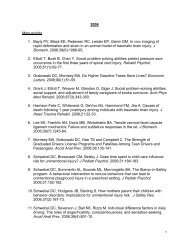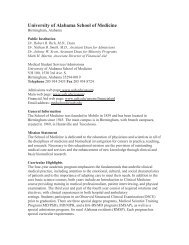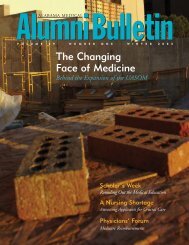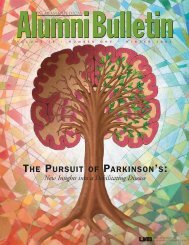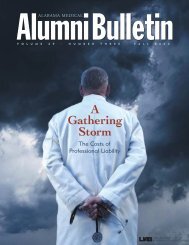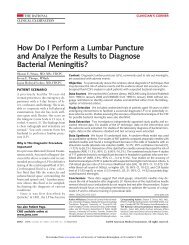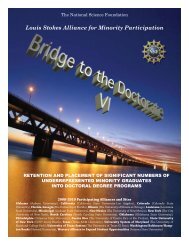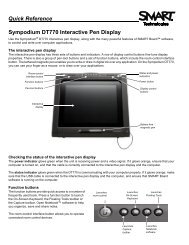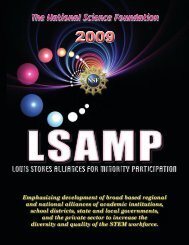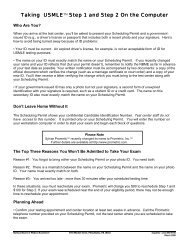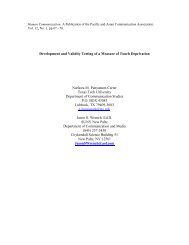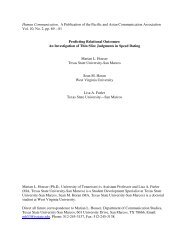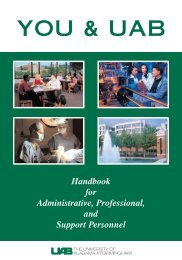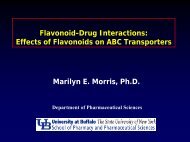AnnuAl RepoRt - University of Alabama at Birmingham
AnnuAl RepoRt - University of Alabama at Birmingham
AnnuAl RepoRt - University of Alabama at Birmingham
You also want an ePaper? Increase the reach of your titles
YUMPU automatically turns print PDFs into web optimized ePapers that Google loves.
First Wave <strong>of</strong> UAB UTC<br />
Distracted Driving Research Complete<br />
The UAB UTC’s first, distracted driving research project,<br />
Distracted Driving in Teens With and Without ADHD-C,<br />
has been successfully completed. Under the direction <strong>of</strong><br />
Dr. Despina Stavrinos, her UTC research team acquired<br />
access to and use <strong>of</strong> a st<strong>at</strong>e-<strong>of</strong>-the-art driving simul<strong>at</strong>or<br />
existing in the labor<strong>at</strong>ory <strong>of</strong> Dr. Karlene Ball, Pr<strong>of</strong>essor<br />
and Chair, UAB Department <strong>of</strong> Psychology.<br />
The purpose <strong>of</strong> Dr. Stavrinos’ research was to compare<br />
the driving performance <strong>of</strong> teens with a medical diagnosis<br />
<strong>of</strong> <strong>at</strong>tention deficit hyperactivity disorder (ADHD) with<br />
a control group <strong>of</strong> teen drivers not suffering from ADHD<br />
in a variety <strong>of</strong> distraction conditions. Dr. Stavrinos’ work<br />
also compared short-term changes in simul<strong>at</strong>ed driving<br />
behavior <strong>of</strong> teens after a six-week computerized cognitive<br />
training program. Distracted Driving in Teens With and<br />
Without ADHD has significantly increased the understanding<br />
<strong>of</strong> the extent to which technology is distracting for<br />
teen drivers, and it facilit<strong>at</strong>ed an objective evalu<strong>at</strong>ion <strong>of</strong><br />
the usefulness <strong>of</strong> a cognitive intervention as a means to<br />
develop safer driving behaviors among teens with ADHD.<br />
The project’s preliminary results are intriguing. Most <strong>of</strong><br />
the study’s participants had been driving for less than two<br />
years and reported being behind the wheel <strong>at</strong> least 5 days<br />
per week. At fault motor vehicle crashes were reported by<br />
nearly 20% <strong>of</strong> the participants. None admitted to cell phone<br />
use <strong>at</strong> the time <strong>of</strong> the crash. The participants with ADHD<br />
had more traffic tickets than the group without ADHD.<br />
Many teens st<strong>at</strong>ed they talked on the phone and engaged<br />
in texting while driving about 3 days per week. Interestingly,<br />
one-third <strong>of</strong> the participants said they did not talk<br />
on the phone while driving and nearly half reported th<strong>at</strong><br />
they never text while driving. Of those teens who reported<br />
talking on the phone and texting while driving,<br />
approxim<strong>at</strong>ely 20% reported doing so every day.<br />
Many teens reported th<strong>at</strong> they modify their driving behavior<br />
when engaging in distracted driving. Over half <strong>of</strong> the<br />
participants reported th<strong>at</strong> they put the caller on speaker<br />
phone, adjust their driving speed (faster or slower), and<br />
search for the phone without taking their eyes <strong>of</strong>f the road.<br />
Student texting while driving in the st<strong>at</strong>e-<strong>of</strong>-the-art driving simul<strong>at</strong>or<br />
Another form <strong>of</strong> driving modific<strong>at</strong>ion while driving distracted<br />
th<strong>at</strong> teens reported was using only one hand to steer<br />
the wheel; a behavior reported by over half <strong>of</strong> participants.<br />
Nearly 50% <strong>of</strong> the teens reported pulling over and stopping<br />
to engage in distracting activities.<br />
The research team is considering the provisional conclusion<br />
th<strong>at</strong> parents <strong>of</strong> teens may not be setting a good example for<br />
their young drivers. For example, approxim<strong>at</strong>ely 50% <strong>of</strong><br />
parents admitted to talking on the phone while driving <strong>at</strong><br />
least 5 days each week. Interestingly, about one-third <strong>of</strong><br />
the parents <strong>of</strong> teens with ADHD reported engaging in the<br />
most dangerous form <strong>of</strong> distracted driving, texting, which<br />
occurred more frequently than parents <strong>of</strong> non-ADHD teens.<br />
The present study suggests th<strong>at</strong> most teens frequently<br />
engage in dangerous distracted driving behaviors, including<br />
talking on a cell phone and texting while driving. The study<br />
is among the first to investig<strong>at</strong>e the potential influence <strong>of</strong><br />
parental distracted driving on the driving behaviors <strong>of</strong> their<br />
teens. These preliminary results suggest th<strong>at</strong> parents may<br />
be a significant source <strong>of</strong> influence on their teens’ distracted<br />
driving behavior. Thus, interventions aimed <strong>at</strong> reducing<br />
distracted driving behaviors in teens might also consider<br />
including a component targeting parental distracted driving;<br />
particularly for teens with ADHD.<br />
While engaging in distracted driving was more common<br />
than not in teens in this study, it is promising th<strong>at</strong> nearly a<br />
third <strong>of</strong> teens did not engage in any form <strong>of</strong> distracted<br />
driving. Future studies should investig<strong>at</strong>e wh<strong>at</strong> factors<br />
might influence some teens from refraining in distracted<br />
driving. This knowledge could be applied to interventions<br />
targeted <strong>at</strong> those who frequently engage in distracted driving.<br />
A final report will be available <strong>at</strong> the end <strong>of</strong> September on<br />
the UAB UTC website www.uab.edu/utc.<br />
research 29



